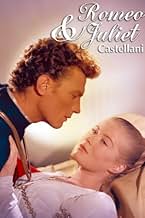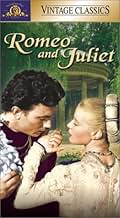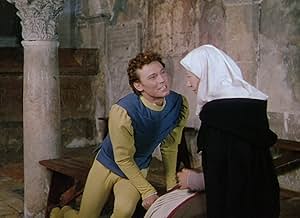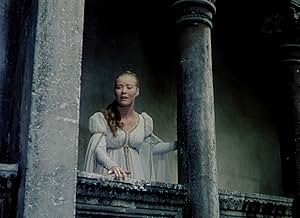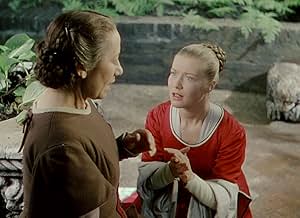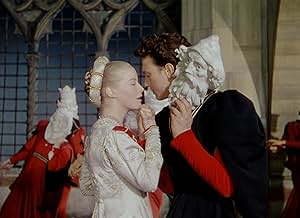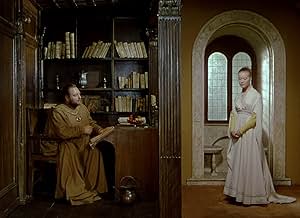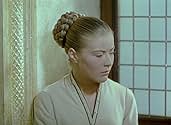VALUTAZIONE IMDb
6,0/10
671
LA TUA VALUTAZIONE
Aggiungi una trama nella tua linguaIn Shakespeare's classic play, the Montagues and Capulets, two families of Renaissance Italy, have hated each other for years, but the son of one family and the daughter of the other fall de... Leggi tuttoIn Shakespeare's classic play, the Montagues and Capulets, two families of Renaissance Italy, have hated each other for years, but the son of one family and the daughter of the other fall desperately in love and secretly marry.In Shakespeare's classic play, the Montagues and Capulets, two families of Renaissance Italy, have hated each other for years, but the son of one family and the daughter of the other fall desperately in love and secretly marry.
- Regia
- Sceneggiatura
- Star
- Nominato ai 3 BAFTA Award
- 6 vittorie e 6 candidature totali
Ennio Flaiano
- Prince of Verona
- (as Giovanni Rota)
Thomas Nicholls
- Brother Giovanni
- (as Tom Nicholls)
Recensioni in evidenza
Handsome, leisurely-paced, ineptly cut, often badly acted (especially by Laurence Harvey as Romeo, surprisingly) version of Shakespeare's most playful and youthful tragedy. Much of the film's charm lies in the creation of sumptuous tableaux in the tradition of Italian Renaissance painting, and the portrayal of Capulet is a marvelously acted stereotype of the fat, crude nouveau riche Italian patriarch; but Harvey (despite a few promising moments early on) is far too effusive and unctuous, creepily reminiscent of John Dall in Rope; Susan Shentall displays admirable coyness and gusto in the "overture" of the dance and courtship scenes, but stiffens and is stifled by the death of a thousand cuts toward the end (although almost nothing is cut from the first act). Still, aside from some ghastly, somnambulistic line readings, the film often dazzles with its feeling for the music of Shakespeare's text; the Nurse's folkloric shanty is highlighted with musical settings (shadings)-- Flora Robson is delightful in the role; the vaguely rappish banter of Benvolio and Romeo's first scene is gracefully and intelligently played. The presentation of the episode of losing the letter due to the Plague is a brilliant use of cinema to bring out embedded narrative in Shakespeare. The near-interchangeability of the actors who play Benvolio, Tybalt and Paris is regrettable.
This lavish British-Italian production about ill-fated and star-crossed lovers deals about the Montagues and Capulets, two feuding families whose young sons Romeo(Laurence Harvey) and Juliet (Susan Shentall) meet and fall in love and whose passion for one another is irresistible . But Juliet's father(Sebastian Cabot) wants marry her to a rich suitor (Norman Wooland) and keep apart Romeo.There are many obstacles on the way and they have to hide their love from the world because both know which their parents will not allow them to be together.The prince of Verona has prohibited duels and fights, but Tybaldo Capulet (Enzo Fiermonte) kills Mercutio and Romeo Montague as revenge murders Tybaldo. The priest friend (Mervyn Johns) prepares a potion for Juliet to simulate her death. Then Romeo is banished to Mantua when he receives the news that Juliet has dead, and happen their tragic destiny.
This is one of the best filmed and most pleasant adaptations of Shakespeare's play. Lush production and well-performed, though is handicapped because the two protagonists are too old for the roles , but at the play they were fifteen and fourteen years old respectively .This sumptuously version has the virtue of good and appealing casting , Laurence Harvey , Flora Robson , Mervyn Johns,Bill Travers and a brief introduction by John Gielgud. Exquisite cinematography by Robert Krasker, a cameraman usual of costumer and historical super-productions (Alexandre the Great , Cid , Fall of the Roman Empire) . Hauntingly wonderful musical score by Roman Vlad .The picture was professionally directed by Renato Castenalli, made in Pinewood Studios and Italian location . Anyone interested in tragic love tales and timeless stories will want to watch this cinematic version on Shakespeare tragedy.
Other versions about this know story are the following ones : the vintage classic, Romeo and Juliet (36)by George Cukor with Norma Shearer and Leslie Howard ; a dancing adaptation (1966) by Paul Czinner with Rudolf Nureyev and Margot Fonteyn ; famous rendition (1968) by Franco Zeffirelli with Leonard Whiting and Olivia Hussey ; and modern versión (1996) by Baz Luhrmann with Leonardo DiCaprio and Claire Danes .
This is one of the best filmed and most pleasant adaptations of Shakespeare's play. Lush production and well-performed, though is handicapped because the two protagonists are too old for the roles , but at the play they were fifteen and fourteen years old respectively .This sumptuously version has the virtue of good and appealing casting , Laurence Harvey , Flora Robson , Mervyn Johns,Bill Travers and a brief introduction by John Gielgud. Exquisite cinematography by Robert Krasker, a cameraman usual of costumer and historical super-productions (Alexandre the Great , Cid , Fall of the Roman Empire) . Hauntingly wonderful musical score by Roman Vlad .The picture was professionally directed by Renato Castenalli, made in Pinewood Studios and Italian location . Anyone interested in tragic love tales and timeless stories will want to watch this cinematic version on Shakespeare tragedy.
Other versions about this know story are the following ones : the vintage classic, Romeo and Juliet (36)by George Cukor with Norma Shearer and Leslie Howard ; a dancing adaptation (1966) by Paul Czinner with Rudolf Nureyev and Margot Fonteyn ; famous rendition (1968) by Franco Zeffirelli with Leonard Whiting and Olivia Hussey ; and modern versión (1996) by Baz Luhrmann with Leonardo DiCaprio and Claire Danes .
Even though the colour and the impressive location scenarios work really well here, the rest of it rather falls between two stools. It lacks the intensity of a stage play and the acting talent assembled - Flora Robson and the underused John Gielgud notwithstanding - is really quite underwhelming. You'll recall the story of the feuding Montagues and Capulets that sees true love emerge from centuries of slaughter and mayhem. It's "Romeo" (Laurence Harvey) who falls for "Juliet" (Susan Shentall) and they must keep their burgeoning romance under wraps for fear of all hell breaking loose. That's becoming harder and harder but as the story unfolds it also becomes much less engaging to watch. Harvey never was a particularly versatile actor and there's virtually no chemistry on display between him and the almost as wooden though maybe a bit more suitably virtuous Shentall. It's very much a lacklustre ensemble effort with few of the originally quirky and notable characters standing up to much scrutiny and somehow Renato Castellani has striven to create something here that belies it's credentials as one of literature's greatest and most enduring love stories. At times, it is almost little better than a very well choreographed and photographed soap. Every now and again these re-imaginings of Shakespeare's works come along, but this one is unlikely to be one anyone remembers too fondly.
There are certain indispensable elements for a great Romeo and Juliet: youthful, energetic lovers; a brilliant Mercutio and irrepressible Nurse; and crisp pacing. Castellani's version fails on all counts. Take pacing. This is a tragedy of timing; the story unfolds over 4 days of desperate urgency. Yet Castellani's screenplay DRRRAAGGSS, interrupting key scenes with tedious stage business. Take the opening brawl: instead of escalating rapidly, it *stops* while the Capulets lug home the body of a servant, women wail, etc. Who cares about the servant? When do we get to the real action? Similarly, when Romeo opens the tomb, Castellani has him stop, walk all the way back outside, find an appropriate tool, and then start over. What a waste of screen time! It's dismaying that these unnecessary scenes are added at the expense of some of the play's best material. A high point in most productions is Mercutio's Queen Mab speech yet Castellani omits it! All directors make cuts, but why this key speech? Castellani seems to think little of Shakespeare's language, preferring his own dialogue. That's right; he cuts Queen Mab but adds vapid filler for Rosaline and other minor characters. Did he really think no one would notice? As for the actors, Susan Shentall sleep-walks through most of her scenes, but after two hours of Lawrence Harvey's plodding monotone, I can't blame her. These actors can't even summon the energy for a proper swordfight; Tybalt merely stabs Mercutio, while a bored looking Romeo bashes Paris over the head. Where's Basil Rathbone when you need him?
This production is often praised for its lush costumes, picturesque Italian locations and cinematography reminiscent of Italian paintings. It's pretty as a picture, but equally lifeless.
This production is often praised for its lush costumes, picturesque Italian locations and cinematography reminiscent of Italian paintings. It's pretty as a picture, but equally lifeless.
10fjoffily
Castellani presents his neo-realistic view of WS's tragedy. Never have the personalities of the two lovers been so intensely portrayed in the screen. Susan Shentall conveys all the fire of the first love and the impending tragedy that will follow it. Laurence Harvey, though not the ideal match (as far as age is concerned) for Shentall's Juliet, manages to pass Romeo's brash, passioned nature. The great Robert Krasker's photography is the work of a consummated master: each picture frame reflects a Renaisssance painting, as well as the sets (all original ones in Venice, Padova, Verona and Siena), costumes and the décor. The best names then available in those fields in Europe were recruited to recreate what Romeo and Juliet's Verona should have been. The result is a joy to watch and is worth the movie. The ball scene alone could receive all the prizes this film was awarded in the 1954 Venice Film Festival. Roman Vlad's use of an Italian medieval gagliarda as the film's dominating musical comment is a lesson in itself. When compared to Castellani's masterpiece, all other versions seem like pale, unfocused, poor readings of WS's immortal tragedy. Hope this film will soon be available on DVD.
The Blu-Ray version of the Castellani "Romeo and Juliet": this is one of the greatest movies of all time. Castellani was surely not a Visconti nor a Rosselini, but his "Romeo and Juliet" is absolute perfection. However, this Blu-Ray incarnation is a disaster. The glorious cinematography (Robert Krasker) is disgraced by a white-washed remastering. The ball scene is completely distorted. The colours that were once a magnificent succession of Renaissance paintings now appear irritatingly blurred. And - alas ! - there is more: subtitles are frequently a gross distortion of the original text - e.g.: in the DVD version the master of ceremonies at the Capulet's ball announces that "... the musicians of Saint Jerome will now play..." In the Blu-ray captions read ..."the musicians of CENTER ROME will now play...". Ghastly. Also, many dialogues are not transcribed, and one frequently bumps into an "a" or a "the" in capital letters in the middle of a sentence. The whole transcription is absolutely amateurish. Therefore, keep your precious DVD of this masterwork and forget this third-rate Blu-Ray.
The Blu-Ray version of the Castellani "Romeo and Juliet": this is one of the greatest movies of all time. Castellani was surely not a Visconti nor a Rosselini, but his "Romeo and Juliet" is absolute perfection. However, this Blu-Ray incarnation is a disaster. The glorious cinematography (Robert Krasker) is disgraced by a white-washed remastering. The ball scene is completely distorted. The colours that were once a magnificent succession of Renaissance paintings now appear irritatingly blurred. And - alas ! - there is more: subtitles are frequently a gross distortion of the original text - e.g.: in the DVD version the master of ceremonies at the Capulet's ball announces that "... the musicians of Saint Jerome will now play..." In the Blu-ray captions read ..."the musicians of CENTER ROME will now play...". Ghastly. Also, many dialogues are not transcribed, and one frequently bumps into an "a" or a "the" in capital letters in the middle of a sentence. The whole transcription is absolutely amateurish. Therefore, keep your precious DVD of this masterwork and forget this third-rate Blu-Ray.
Lo sapevi?
- QuizDame Joan Collins was originally slated to play Juliet, but turned it down when Writer and Director Renato Castellani insisted she undergo surgery to change the shape of her nose.
- ConnessioniReferenced in Arena: All the World's a Screen - Shakespeare on Film (2016)
I più visti
Accedi per valutare e creare un elenco di titoli salvati per ottenere consigli personalizzati
- How long is Romeo and Juliet?Powered by Alexa
Dettagli
- Data di uscita
- Paesi di origine
- Sito ufficiale
- Lingue
- Celebre anche come
- Romeo and Juliet
- Luoghi delle riprese
- Italia(made in Italy)
- Aziende produttrici
- Vedi altri crediti dell’azienda su IMDbPro
- Tempo di esecuzione2 ore 21 minuti
Contribuisci a questa pagina
Suggerisci una modifica o aggiungi i contenuti mancanti

Divario superiore
By what name was Giulietta e Romeo (1954) officially released in Canada in English?
Rispondi
